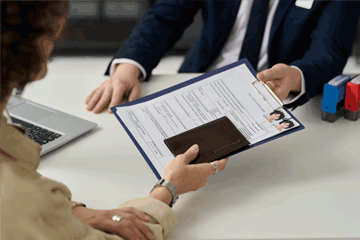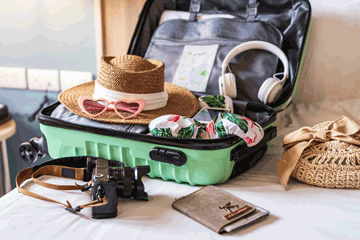Travel insurance can give you that extra bit of protection if something goes wrong. You can usually claim for medical expenses, personal injury, cancellations or delays and lost or stolen baggage. Read our guide below on how to make a claim as hassle-free as possible. So, there's less for you to worry about.

How do I make a claim on my travel insurance?
To make a travel insurance claim, here's how to get started:
First, gather all of your key documents. It's a good idea to have:
-
Your passport
-
Visa
-
Flight details
-
Your travel insurance policy documents
Take a copy of each with you, and leave an extra set with a friend or loved one back home. And, don't forget to jot down your insurer's emergency number! You'll be able to find it in your policy's wording.
Every insurer's claims process is a bit different, but here's the general approach:
-
Reach out to your insurer as soon as possible. You should also contact the relevant authorities if you need to. For instance, you might need to do this if your belongings are stolen.
-
Collect supporting evidence for your claim. For example, photos or any documentation the police or other officials provide.
-
Share accurate information with your insurer. Being thorough here helps them understand your situation better and speed up the process.
Your insurer can handle some insurance claims with a quick phone call, while others may need forms and supporting documents.
If you're mailing forms, keep a copy for yourself in case you need to refer back to them. Many insurers have online claim forms too.
If you're unsure of the best way to get in touch, check your policy details. There should be contact numbers and claim instructions!
How do I claim for flight delays and cancellations?
If your flight is delayed or cancelled, start by checking with your airline or tour operator. They're usually your best bet for handling compensation directly. Usually, they'll be able to offer you compensation on the spot. But, if they don't, your next option might be your travel insurance.
To make a claim, you'll need proof of the delay or cancellation. Ideally, ask the airline or tour operator for written confirmation while you're still at the airport. That way, you'll have an official record of the disruption. If that's not possible, follow up as soon as you're back home. Waiting too long can make it trickier to get the documentation you need to support your claim. You might also need your booking confirmation, boarding pass and proof that the airline or tour operator didn't offer compensation or alternative arrangements.
Generally, your airline should offer compensation if the delay or cancellation was within their control. But, each airline has its own policies, so it's worth double-checking what you might be entitled to. By staying on top of these steps, you'll be ready to claim back any compensation you're owed. Phew!
How do I make a claim for medical emergencies?
Most travel insurance policies cover medical emergencies—so if you get sick or injured, you'll be covered for urgent medical help. They also often include repatriation insurance, which means your insurer can help cover costs associated with bringing you home for treatment if needed.
Start by keeping your insurer's emergency number and your policy number handy. If you need medical treatment while you're away, contact your insurer to get approval for the treatment. This should fall under the medical cover section of your policy, which is typically included as standard, up to a set amount. Ideally, you should contact your insurer before you have treatment. Although, in an emergency this might not be possible.
In some cases, you may need to pay for treatment upfront and claim it back when you're home. Be sure to keep all documentation, as you'll need proof to support your claim. Also, if you're in a country that accepts the European Health Insurance Card (EHIC) or a Global Health Insurance Card (GHIC) you might be required to use it as a condition of your policy. So, keep this in mind.
If you do use your EHIC or GHIC, you can get reimbursed for any out-of-pocket expenses through the NHS Overseas Healthcare Service. This way, you might not need to claim on your travel insurance. But, if you do need to claim on your policy, you'll usually need the following to support it:
-
Receipts for any upfront payments you made.
-
Signed, dated medical reports that describe your treatment.
-
Invoices showing the costs of services received.
-
EHIC or GHIC details, if you used yours in an eligible country.
Once you get home, inform your doctor. They'll be able to help you with any follow-up care you might need. Following these steps will help make your claim process smoother. But, if you have any questions, just reach out to your insurer.
How do I report a crime while on holiday?
If you experience a crime on holiday, here's what you need to do to make a claim and get the support you need.
First, report the crime to the local police within 24 hours. Insurers usually need a formal police report. Reporting the crime helps to resolve the claim quickly, it can also help avoid complications when you return home.
It's natural to feel shaken, but try to stay focused on filling out all documents accurately. Note the names and contact details of any officers you speak to, as this information can be helpful later.
Be sure to keep copies of all documents and paperwork related to the incident, too. Most insurers will need the following to process your claim:
-
A local police report filed within 24 hours.
-
Receipts or proof of any stolen items, like electronics or valuables.
-
Contact information for any witnesses if available.
-
Any records of communication with local authorities about the incident.
This process may feel overwhelming. But, taking these steps can help to make your claim much easier to handle.
How do I claim for cancellation or curtailment?
Need to make a claim for cancelling or cutting a trip short? Here's what you need to know:
Trip cancellation means you couldn't start your trip due to unexpected reasons covered by your insurance. And, curtailment means you had to cut your trip short and return home early for a similar unexpected reason. Most travel insurance policies include travel cancellation cover as standard, usually up to a set amount.
Most travel insurance policies allow claims for specific, unexpected events that happen after you've purchased your policy. Commonly accepted reasons can include:
-
An unexpected death or serious illness involving you, a travel companion, or a close relative.
-
Job redundancy.
-
Being called for jury duty or required to testify in court.
-
Significant issues at home before you depart, like a flood, fire, or burglary.
Most standard policies offer coverage for these types of issues. So, if you need to make a claim, you might be covered for:
-
The cost of unused accommodation.
-
Travel expenses to return home if new arrangements are needed.
-
Prepaid excursions you weren't able to attend.
To support your claim, you'll need proof that verifies why you couldn't travel or had to return early. This could include documentation such as a court order, medical note or death certificate.
Having the right information will make the claims process smoother and help to reduce the chance of it being denied. If you're ever in doubt, don't hesitate to reach out to your insurer for further guidance if you need it. They're there to help!
Is there a time limit in which I need to make a travel insurance claim?
Yes, there's usually a time limit for making a travel insurance claim. But, it can vary based on your provider and what policy you have. For some providers, this might mean submitting within 48 hours. But, others might offer up to 31 days to a few months.
Generally, insurers suggest filing your claim as soon as possible once you're back home.
It's always best to check your policy details to know exactly how long you have. And, don't worry if it takes a little while to process—this is normal. Claims can sometimes take a few months, especially during busy travel seasons like the summer.
The key is to get your claim in as early as you can so your insurer can resolve the claim quickly.
What should I do if my travel insurance claim is denied?
If your travel insurance claim has been denied, don't worry—there's steps you can take!
Understanding why claims are sometimes declined can help you avoid future issues. Let's take a look at some common reasons why travel insurance claims are denied, and what you can do next:
-
Excess amounts. If the claim payout is less than your policy's excess, your insurer might reject the claim. So, this means that your insurer might not cover costs that fall below your excess threshold.
-
Policy exclusions. Travel insurance policies often come with specific exclusions. For example, if you get injured doing an activity not covered by your policy, you probably won't be covered for any related medical claims.
-
Replacement costs. If you've paid more than your insurer considers 'reasonable' for replacements after theft, loss or damage, your claim could be denied. This is because insurers usually have a limit on what they'll reimburse.
-
Claims for preventable incidents. Some claims might be denied if the insurer believes the incident was preventable. For example, losing items that were left unattended.
-
Undisclosed pre-existing medical conditions. If you make a claim related to a pre-existing medical condition you didn't declare, your insurer might refuse your claim.
-
Ignoring travel advice. If the Foreign, Commonwealth and Development Office (FCDO) advises against travel but you go anyway, it could invalidate your policy. This includes things like known events, such as natural disasters.
You're entitled to know why your claim was denied, so make sure to ask your insurer if you don't understand. And, heads up—if you feel your claim was unfairly denied, it's okay to question it. Help is available if you think your case deserves another look!
Start by reaching out to your insurer's complaints department and explain your case. If it's not resolved to your satisfaction, you can escalate your complaint to the Financial Ombudsman Service (FOS). The FOS will provide an independent decision that your insurer has to legally accept.
You can also create an appeals letter that you can send to your insurer. If you have any additional evidence to support your claim, include it. You never know, it might help your case! Keep in mind that the appeals process can vary between providers. So, check with your insurer to know what their specific process is.
Compare travel insurance








